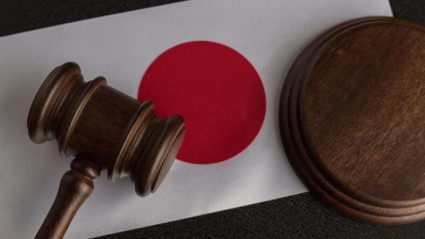Japan ages and ages, its birthrate falls and falls, no end in sight. What next? No one knows. Population shrinkage on this scale, in all historical precedents, came from war, famine or plague. In peace, abundance and health people made babies. It was life, it was natural. No longer.
Consider the numbers: 727,277 births in 2023 as against 2.5 million in 1947; 1.2 children on average born per woman in 2023 versus 4.5 in 1947. It’s not a strictly fair comparison. 1947 represents both a peak and a nadir. The war was over, the nation in ruins, death everywhere; making babies meant a new beginning eagerly embraced, an exuberance that springs maybe only from despair. A brief upsurge in the 1970s aside, the decline has been steady since but precipitous lately, almost every year setting a new record low. 2023’s 727,277 births are a drop from 848,659 in 2022 – the steepest year-on-year plunge ever.
The government is aware, alert and alarmed. In January it announced a “new dimension” approach – more financial support to more families covering more expenses associated with more aspects of childbearing and child rearing. Good and necessary, says demographer Ryohei Mogi in conversation with Weekly Playboy (July 8). But his approval is qualified. What after all, he asks, is “new”? Where’s the “new dimension”? Nowhere. It’s just more money poured into old channels. It won’t do, he fears.
Ultra-low birthrates are not unique to Japan. They are common to just about all so-called developed countries. Rising prosperity, historically a generator of rising population, now engenders instead increased freedom, career opportunities, leisure options and other such modern novelties that make childbearing, if not simply an obstacle to the good life, easily dispensed with, conditional on personal convenience or a certain level of individual or household prosperity, absent either of which, childbearing is put on hold and put on hold again, until what began as postponement turns permanent and that, as they say, is the end of that.
Demographers usually figure 2.07 births per woman as the rate that sustains a current population. Japan’s last year above that was 1973, descent steady since then. A situation sowing panic now has been simmering a long time, few noticing. Why? one can’t help wondering. The parallel to global warming is hard to miss.
But Japan has plenty of company. Even countries whose family planning and child support systems win global praise have birth rates well below 2 – France 1.65; Finland 1.26. And so on: the U.S. 1.66; Australia 1.58; Canada 1.33, U.K. 1.75. Nowhere is the decline so steep as in Asia. Japan’s neighbors make it look fecund in comparison: China 1.09, Singapore 0.97, South Korea 0.72.
The same mechanisms are in play everywhere. People marry late or not at all. Late marriages produce fewer children, Mogi notes – in Japan’s case, 2.1 children on average born to women marrying under 25, 1.0 to those marrying at 35 or over. The real solution, he says, would be to get people marrying – but how? The “new dimension” plan, he says, targets people already married. Metro Tokyo’s government will shortly release its own dating app, with stricter standards than many private ones and hopefully proof against the various frauds and exploitations that bedevil the sector. Will it help? Mogi is doubtful.
His analysis is reminiscent of the political cliché an aide to former U.S. President Bill Clinton set in motion: “It’s the economy, stupid.” True enough, spontaneous social intercourse is at a low ebb. Enter dating apps and suchlike intermediaries. Their function is to bring people together and help them move from acquaintance through friendship to marriage and baby-making. So far so good. But, Mogi says, the main obstacles to marriage are economic: part-time low-wage employment and job instability. You can’t – or at least large swaths of people feel you can’t – raise a family under those conditions. Tokyo’s dating app is unlikely to change that.
Nor will it change the gender inequality that Japan is proving markedly slower than other developed countries to remedy. Weekly Playboy cites a health and labor ministry survey showing 85 percent of working mothers took maternity leave in 2021 – as against 14 percent of fathers taking paternity leave. The same survey shows mothers do five times as much housework as fathers. This hardly encourages young women to rush into motherhood. The days when there was little else for women to do are long gone.
So what’s the answer then? Build a society, says Mogi, in which individuals can live as they please, economically secure and embracing the lifestyle that suits them, and the birth rate will rise. To the economic stability he stresses we might add political, geopolitical and meteorological stability – global prospects for which, at present, are hardly encouraging.
© Japan Today













25 Comments
falseflagsteve
It’s the economy stupid!
GBR48
quote: peace, abundance and health.
All of which have been conspicuous by their absence recently. It's a toss up whether WW III, climate change, poverty, famine or Covid II will polish us off. No great incentive to have children there. People don't plan for a future that they no longer believe they will have.
garypen
Because all of their measures thus far have been too small and too short-sighted. They need long-term solutions to address income, work-life balance, cost-of-living, and daycare.
Banthu
Why?
Because feminism taught women that empowerment, liberation and freedom come from ditching relationships and family and focusing only on climbing the corporate.
After you're 45 and you're a CEO, then you can have kids.
Oops... potential husbands are a little hard to come by at that age, and so are kids
Gene Hennigh
8+ billion people on earth. Maybe Japan has the right idea. We'd do better with 6 or even 4 billion. Not to worry. Instead of bloodless solution the hydrogen bombs will do our work for us. Fewer babies isn't happening quickly enough. I like Japan's situation better, though.
virusrex
No, that would not be a reason, at least not one that has any kind of evidence behind to support it, the same as the claim that diversity is causing all the problems of modern societies it is only a deflection from people that refuse to accept their prejudices are wrong and society left them behind.
profsid
No politician has defined the target of a sustainable population. Japan
imports most of its energy needs and most of its food, which is not
sustainable if there are disruptions. To increase the population by
supporting more births means that we must assume we have a
situation that is sustainable. That is not the case. Japan overshot
its goals set during the Meiji Era and in the 1950's had a policy
to reduce population growth. Japan needs a sustainable goal,
perhaps 80 million which seems to be the unspoken assumed
target of young people.
DanteKH
Good article.
Ryohei Mogi is correct on his assessment. However, there is still one big problem. Seems like nobody is tackling the exact root cause of this population decline. Root cause such as introvertism of modern Japanese people, the extremely poor social skills involving dating, and similar. Then there is the financial incentive. As a man who already has 2 kids born and raised in Japan, let me tell you right aways. There is absolutely ZERO support from the government. They are totally clueless on how much money nowadays are required not only to raise a baby, but also to bring one onto this world. I can perfectly understand why in Japan nobody wants to have babies and children anymore.
deanzaZZR
Those are crazy numbers when you consider that Japan's population was 80 million at the time.
collegepark30349
Because they only focus on making the lives of the parents better. There is no focus on making the lives of the children better. A lot of people here did not particularly enjoy their childhoods and do not want to visit the same thing on their children: over crowded classrooms, 70-year-old school buildings, busy work disguised as "education," juken, ridiculous bukatsu schedules, bullying, commuting 90 min to high school because it is the only one that had the course you wanted to take, crazy school and society rules... . They did not enjoy being young and know nothing will change - it hasn't in 70 years. Why force your children into something you did not like? Make the lives of 5 - 18 year olds better and more people will want children.
Amen
opheliajadefeldt
As a 24yr old female I woud never choose to have a child in today's world, regardless of what country. When I read about Japan's problem, it would seem that child care is the last thing on any governments mind, then there is the never ending societal problems, Japan is a patriarchal society, where men have always dominated, that has to change, but I i do not see it ever happening. Then there is the education system, which is drastically cruel to all children, from extended school hours, studying well in to the evening, it must be nearly relentless, and one more thing, school bullying, which is a huge problem, it is so wide spread that no one takes any notice now. Schools policies need to be reconstructed, and better training given to all teachers, so that bullying complaints are NOT swept under the proverbial rug as they are now.
mikeylikesit
“It’s an economic problem, but none of our economic solutions is working!”
Gee, maybe it’s not an economic problem. All the free daycare, stipends for babies, tax cuts for families, and other economic handouts aren’t going to move the needle one degree. They haven’t so far, and more of the same won’t work.
People are not sad, disaffected, and disconnected from other people because they are poor. If this were true, then Africa would have the lowest birthrate in the world. Instead, it’s the economically “comfortable” people in wealthier countries who aren’t having kids. People are ill socially and spiritually. Solutions that ignore these social and spiritual ills will fail.
Moonraker
I think the women are making the right decision, albeit unconsciously.
Paul Dolan, a professor of behavioural science at the London School of Economics, said the latest evidence showed that the traditional markers used to measure success did not correlate with happiness – particularly marriage and raising children. “We do have some good longitudinal data following the same people over time, but I am going to do a massive disservice to that science and just say: if you’re a man, you should probably get married; if you’re a woman, don’t bother.”
So, there it is. Look after number one. This will be congruent with the imperatives of the market too. For the men, there are still plenty of women in poorer countries, still with the conventional mindset, looking for husbands, so find one and marry one. Lots of Japanese men have done this before you.
Aly Rustom
Why are all measures being taken to reverse Japan's falling birthrate failing?
With the exception of Israel, no country has been able to reverse it. The west has been able to mitigate it with immigration.
Ken
There are a few good points in this, both Japan and South Korea have a big problem with bullying as well everything being made out to benefit males more. Fixing one of the issues to the declining birthrate isn't going to stop the birthrate from declining. At least not until the other 5 or 6 problems get solved too. The times are changing and you either change with it or adapt to the new affects.
virusrex
If that was the focus it would be completely understandable, the children are not the ones deciding how many children would be in the family, that is still something the parents are doing. So if the government was actually making their lives better it would have an effect on the birthrate. The reality is that the focus of the measures is not making the lives of the parents better (since that would require huge social and economic changes), the focus is instead on implementing the easiest, cheapest measures they can get away while pretending to care.
People are not going to have children with the current situation, not if they think about the children and not if they only care about themselves.
Ken
I don't think that is a solution that counts though, with how harshly immigrants are getting treated in the west and besides that I'm sure Japan is wanting more Japanese population not more citizens who want a forever visa or something
Aly Rustom
I hear you. But immigrants being treated harshly is nothing new. And its not just immigrants. Native born people of color as well as indigenous people are harshly treated in the west. Racism is a fundamental issue we have to tackle head on and it is certainly not a good counter argument against immigration.
As for what the Japanese want, I can see the winds of change. Immigration was hardly discussed 20 years ago and we see now that the Japanese are coming around and changing their minds. Without immigration, Japan is doomed. People here are starting to realize that. And they are slowly opening up to the idea.
And as countries around the world experience population decline (and not just the rich ones either) there will be a smaller and smaller pool of potential immigrants to choose from- even from the poorer countries. And as the developed world gets more and more desperate for immigrants as their populations decline, eventually we could see a complete shift in attitudes with countries begging and making it easier to come and settle, and with immigrants humming and hawing about where they want to go.
Aly Rustom
Here is are a few youtube videos talking about the issue. These are 2 Canadian demographers. What they have to say is very interesting. And ominous
The World's Shrinking Population (youtube.com)
Population Collapse Is Coming: Crisis Of Empty Planet – Darrell Bricker | Wisdom Rebellion #010 (youtube.com)
Ken
Because of how the west is I don't think it is a good example to use. Knowing you would always be profiled as a terrorist or a criminal isn't ideal for the people who are immigrating, they are only doing so because they don't have any better options. It would take a lot more moral cleansing for some of the viewpoints of the older generation of Japanese to be more accepting towards others. Long story short birthrate and immigration have no relation whatsoever
Aly Rustom
I don't agree with this premise. Sure there are issues with immigrants everywhere. But there is nowhere you can live without being othered by someone else. Its a part of life. And I don't think immigration in the west can be seen as a monolithic structure. I feel some countries in the west have done better by their immigrants than others.
Well of course. People immigrate because of better options for themselves and their families. That makes perfect sense. No one would uproot themselves for absolutely no good reason.
I agree. Japan has A LONG WAY to go before completely accepting immigrants. No one in their right mind would say that as a society they are completely open to the idea. But more and more of them see it as inevitable.
On this Ken, we will have to fundamentally and respectfully disagree.
GillislowTier
Cause the people in charge have absolutely 0 contact with anyone of child bearing age or their needs and desires in the current era. What does some 75+ old career politician know about getting a 20s aged group interested in child care? Nothing and they keep proving it.
When your government is constantly bringing up the topic, but somehow still blames women even in roundabout ways that ultimately sound like “just do it!” Why would any self respecting person go through it these days.
Economy is bad and getting worse. We make little to no money for ourselves but we’re somehow expected to live off 1 salary “because women should leave the workplace when they have a kid”, my career won’t recover, the government subsidies to convince me to have a kid are laughable “3man is enough to raise a baby right? No you old fart it’s not!” And a pretty big one here… kids are not resources to keep the country going, they are people. Our people, stop referring to the birthrate like your selling potatoes.
Ken
IDK being a Japanese dude in Japan or being a Caucasian male in America probably must be paradise for them. The past 2 or 3 years I have been seeing how often women aren't being treated as well as they should and how everything is more strict for them in most situations as well like even when they are doing right society still finds a way to tell them they are doing wrong. And yeah we can say the west is doing better when it comes to immigrating but if you play a sport like tennis for example and after shaking your opponents hand you can't give them the middle finger and say it's okay because you already showed good sportsmanship first
Geeter Mckluskie
With 50% of current jobs being rendered obsolete by AI and mass-automation within the next 2 decades a reduction in population is prudent at this time in Japan's history. Politicians are short-sighted on this point and only want the quick fix of immediate tax revenue increases for their own expenditures. Politicians who truly have their citizens' best interests in mind would not be so determined to fill their pockets today only to have the burden of the huge number of unemployable people to go along with the burden of an elderly population putting even more strain on the public coffers.
Ken
Exactly!